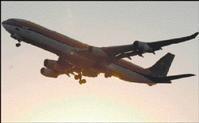Dennise Williams, Staff Reporter
WHILE AIR Jamaica continues to claw its way out of bankruptcy, the airline has found itself facing the similar fate of the international airline industry how to create profits in an era of falling airfares and rising operating costs.
The fact is, travellers are price-sensitive and armed with information, courtesy of the Internet, are not prepared to pay more out of brand loyalty.
And the industry itself is very cut-throat with carriers seeking new routes to create new revenue streams.
Take, for example, the Fort Lauderdale airfare battle that has recently erupted.
NEW AIRLINE IN JAMAICA
Last weekend, US Airways, a Virginia based airline, threw its hat in the ring and began offering US$228 flights out of Kingston to Fort Lauderdale.
According to its press release issued on August 2004, "US Airways announced a major expansion at Fort Lauderdale Hollywood International Airport, more than tripling its daily flights and connecting 10 Caribbean and Latin American destinations with key cities in the Northeast and Florida, beginning in February 2005."
The route to Jamaica has become part of US Airways' overall expansion programme. And according to the airline's newspaper advertisement, they intend to offer service to at least twelve major United States cities out of Kingston.
So despite its current financial woes, Air Jamaica had no choice but to match fares. On January 25, the national carrier announced a US$228 flight to the Florida city. Will Rodgers, Air Jamaica senior vice president of industry affairs stated, "We hope passengers will take this golden opportunity to visit friends and family, conduct business, or explore Fort Lauderdale."
However, one must question if the price matching game can go on forever, and if it will lead to profitability. According to a report published in the Financial Post, it cannot and will not.
At least one expert insists that airlines will have to decide what market they will serve, and create profitability in their niche market or face the possibility of 'profitless growth.'
REWORK BUSINESS PLANS
William Hanley writes in the Canadian based Financial Post, "Nawal Taneja, chairman of the aviation department at Ohio State University and author of seven books about the industry, said in an interview that those airlines that do survive will have to make hard decisions about which segments of the business they will pursue.
Mr. Taneja said airlines must decide which segments of the business they want to be in, following the lead of successful carriers such as no-frills Southwest Airlines and high-end international carrier Singapore Airlines.
He sees two types of airlines emerging world-wide. One type of carrier will serve only one segment, whether it be low-cost, high-end or something in between. Another type of carrier will identify, say, eight segments, and decide to serve three of them."
What marketing model will Air Jamaica follow? High-end luxury for the discriminating traveller or bare bones service? Is it possible that the Champagne Flights will become the Cola Champagne Flights as the company seeks cost saving opportunities? Or could the company seek a happy medium and offer two types of packages? Air Jamaica executives were tight lipped when pressed for answers.
However, when the airline decides on its target market, the next step is to ruthlessly contain costs.
CONTROLLING COSTS
Mr. Hanley writes, "Mr. Taneja lists a dozen things that have made it almost impossible for the majority of airlines to earn a reasonable return on investment, including excessive government intervention, vulnerability to weather and infrastructure, high fixed costs, problems with organised labour, high cyclicality and seasonality, high capital and fuel intensity and, not least, "destructive competition."
Although the national carrier's executives are keeping their plan of action close to their chests, the effects of 'destructive competition' is something they do acknowledge without going into further detail.
Still, the company has taken tentative steps to control costs.
Air Jamaica has already terminated the leases on three out of twenty planes it held; reduced executives salaries and made 100 flight attendants and 34 ground staff redundant. The national carrier has also reduced their pilots per diem meal allowance from US$70 to US$50.
Airline executives promise more restructuring to come.













